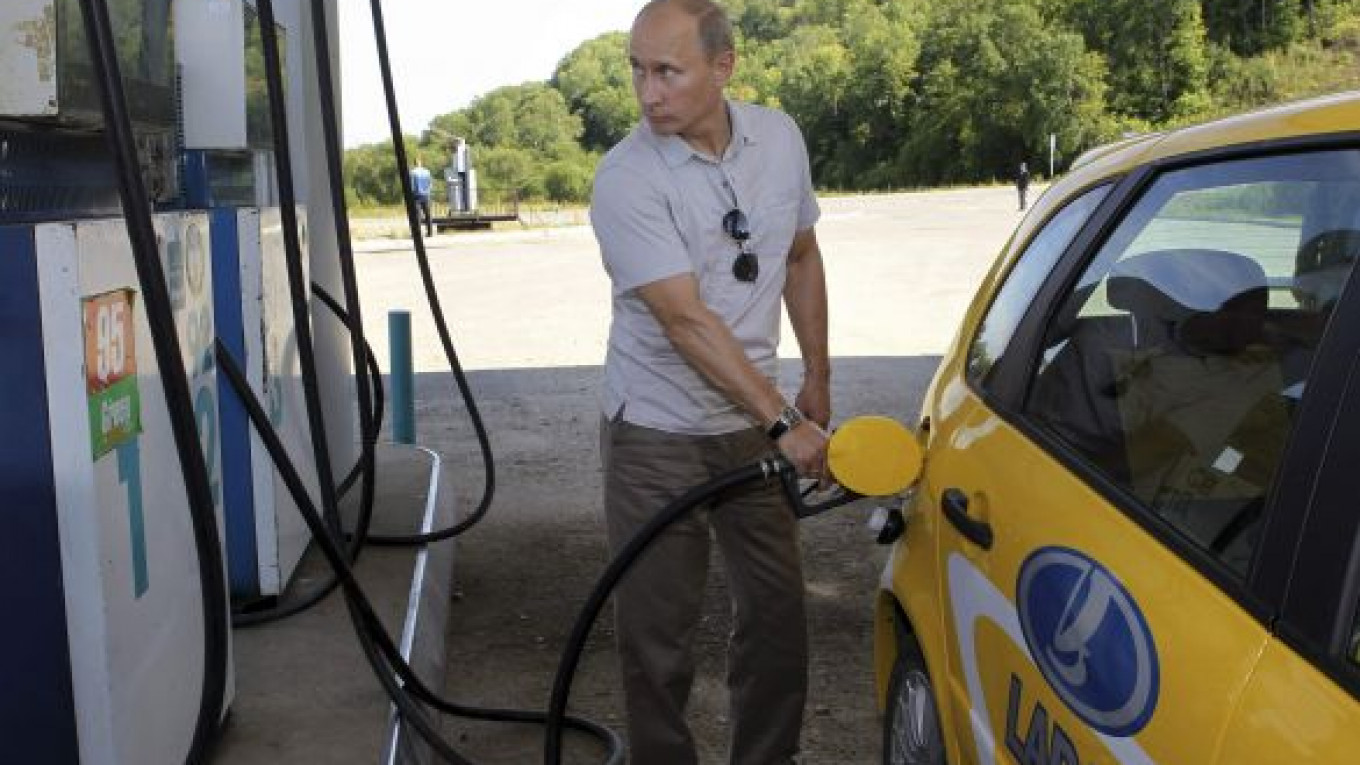Prime Minister Vladimir Putin got behind the wheel of a Glonass-equipped Lada Kalina to test the new Amur highway over the weekend, but he complained that the “historic” road’s quality was unsatisfactory and that gas prices are too high.
The government is planning to raise excise taxes on fuel next year to help rebuild Russia's notoriously bad roads. Analysts have called the move risky, as drivers are a well-organized political force and have opposed the taxes.
In an apparent recognition of those complaints, Putin posed on Friday at a Khabarovsk region gas station, filling up the tank. On Sunday, the prime minister tried to console road workers who asked him whether gasoline prices would keep rising.
"I think the prices for gasoline in Russia are too high, in the western part and in the east," he said, according to a transcript posted on the government web site.
"We're trying to fight this somehow with our main [oil] companies," he said.
"In recent years we've at least been able to keep [price growth] restrained. And I think that in general, prices need to be restrained," Putin said, noting that anti-monopoly officials and prosecutors needed to remain vigilant.
He met with workers who built the final stretch of the Amur highway, running from Chita, in the Zabaikalsky region, to Khabarovsk, near the Pacific coast. The connection, Putin noted, was "historic" as the first motorway fully linking western Russia to the Pacific.
"Finally, we did it. I should have a look," he said.
The prime minister traveled about 350 kilometers in a bright yellow Lada Kalina provided by AvtoVAZ, the country's largest carmaker. He told reporters that he would not personally drive the entire trip.
AvtoVAZ representatives asked him to test drive the vehicle, which came equipped with a Glonass navigation system. Government officials have been actively promoting the technology as a homegrown alternative to GPS.
Putin, who owns a Lada Niva, said it was important that he test drove the Lada, which is "the most popular car in our country, used by millions of people."
Four of Russia's five most popular new cars last year were made by AvtoVAZ, and the brand has benefited from the government's cash-for-clunkers rebate program.
"The car unexpectedly turned out to be very cozy, comfortable and reliable. Try to buy such a car. I can assure you, you won't be disappointed," he told motorists Friday at the gas station, RIA-Novosti reported.
The road, however, left Putin considerably less satisfied. He called it a "good country road," but told Transportation Minister Igor Levitin that the work was clearly "1995 quality" at the road's start, Rossia-24 state television reported.
The 2,100-kilometer road was begun more than 30 years ago, but much of it has been built since then-President Putin signed an order in 2001 establishing the route as a priority.
Finance Minister Alexei Kudrin said separately on Saturday that the country's roads could reach European quality in the next 10 years, once a federal fund is formed to finance construction and repairs.
"That means that all the roads will be level, and it will be possible to travel them without potholes and without getting stuck," he told reporters in Yakutsk, in the far eastern republic of Sakha.
In July, President Dmitry Medvedev approved the government's proposal to increase the excise tax on gasoline by 1 ruble per liter annually over the coming three years. The revenue would enter the Federal Road Fund.
The government expects that after the tax is increased, the federal budget will get an additional 83 billion rubles ($2.7 billion) in 2011, with 34 billion rubles to be appropriated for road repairs. A total of 87 billion rubles and 139.7 billion rubles will be appropriated for this purpose in 2012 and 2013, respectively.
But increasing the excise tax is likely to solve only part of the problems, Finam analyst Dmitry Baranov said Sunday.
"More money doesn't mean that the roads will be of a higher quality. The roads' quality depends not only on … the money but on the quality of construction, on the workers' efforts, on not having theft," he said. "It's also necessary to use good materials and modern technologies, and to take the climate into account."
Putin on Sunday opened a pipeline branch to carry Siberian oil to China and hailed Russia's energy business in China as an important counterweight to its traditional European clients.
Putin was speaking in the town of Skovorodino, the end of the pipeline to the Pacific region, in honor of the completion of a branch that will carry oil to the Chinese town of Daqing from the end of the year. PetroChina is the importer.
"This is an important project for us because we are starting to diversify sales of our energy resources. To this day, the main deliveries are to our European partners. They get around 120 million to 130 million tons of our oil today," Putin said on Russian radio.
(Reuters)
A Message from The Moscow Times:
Dear readers,
We are facing unprecedented challenges. Russia's Prosecutor General's Office has designated The Moscow Times as an "undesirable" organization, criminalizing our work and putting our staff at risk of prosecution. This follows our earlier unjust labeling as a "foreign agent."
These actions are direct attempts to silence independent journalism in Russia. The authorities claim our work "discredits the decisions of the Russian leadership." We see things differently: we strive to provide accurate, unbiased reporting on Russia.
We, the journalists of The Moscow Times, refuse to be silenced. But to continue our work, we need your help.
Your support, no matter how small, makes a world of difference. If you can, please support us monthly starting from just $2. It's quick to set up, and every contribution makes a significant impact.
By supporting The Moscow Times, you're defending open, independent journalism in the face of repression. Thank you for standing with us.
Remind me later.






